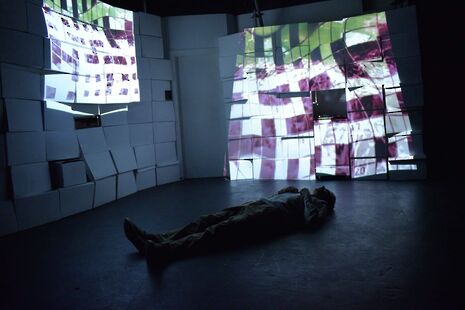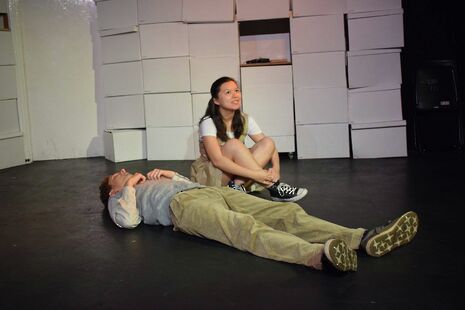Review: The Language Archive
Amid the heat of the Corpus Playroom, Celeste Pan finds this May Week tragicomedy “tastefully and thoughtfully executed”

“Lately, I’ve become worried about my wife.” The initial minute-long silence is eventually broken as the montage-like recapitulation of George’s domestic life gives way to, and merges with, a more immediate form of reality. Comment and exposition, however, do nothing to allay the suffocating exasperation and unease that dominate the apartment, matched somewhat aptly by the temperature within the Corpus Playroom.
The exchange between husband and wife constantly misfires, misappropriates and contradicts. Functioning as backdrop to both archive and home, the set, in the form of loosely stacked-up white boxes, mirrors the dangerously precarious state of George and Mary’s marriage; the surface argues for clarity and order while the slightest quiver might demolish the entire facade.
Julia Cho’s The Language Archive does just what its title promises – it interrogates, primarily, the plethora of forms and functions which human communication takes. The overall evaluation seems less than positive. Each character struggles, in one way or another, with a profound crisis of articulation and comprehension.
Even a “passable acquaintance” with eight languages, as in the case of George, helps very little, for the translation between speech and emotion, words and thought is infinitely more complex than that between English and Esperanto. Yet the lyrical comedy is simultaneously a love letter to human speech itself; its elegance, its fragility and its heterogeneity never fail to delight and move throughout the script.
“Teuta Day as the long-suffering optimist Mary is delightful, exerting a firm magnetic pull on the sympathy of the audience.”
The 2009 play’s Cambridge debut is tastefully and thoughtfully executed by Caroline Yu, who made significant technical innovations with respects to set design and lighting, namely through the projection of images and video footage at various moments in the play. With the minimal change undergone by the stage between scenes, the playing space becomes in itself amorphous; George’s recording desk, when reversed, becomes Mary’s kneading table. The originally nondescript backdrop gradually accumulates layers of meaning; like any word, or any gesture.

Harry Burke offers a sensitive, if not at times slightly caricatural, reading of the aloof, troubled linguist who has yet to learn the language of love. As the tragicomic centre of the play, his wonderfully outrageous inconsiderateness is complemented by an inner enthusiasm and vulnerability which surface chiefly in monologues, delivered with remarkable gravitas and charm. Teuta Day as the long-suffering optimist Mary is delightful, exerting a firm magnetic pull on the sympathy of the audience. The besotted assistant Emma (Cara Fung), however, is portrayed with considerably less finesse; there are times where melodrama inundates genuine emotion and exaggeration threatens to turn the infatuation-plot into downright farce.
The dismal overtone of the love triangle is relieved by the entrance of the elderly Ellowans, Resten (Conor Dumbrell) and Alta (Ananya Mishra), both dressed in distinctly ethnic clothing resembling that of the Balkans. While the comic effect cannot have been more thoroughly brought out, the couple’s conspicuously disparate accents and Resten’s own accentual vacillation, between one more standardly English and another more contrivedly foreign, could generate a certain degree of confusion and inauthenticity. The same criticism can be made in relation to the lack of linguistic differentiation in the doubling of Alta with the Esperanto teacher.
On the whole, a smooth and burnished working of a lesser-known yet finely-written screenplay, that could be perfected by some more accent coaching
 News / Judge Business School advisor resigns over Epstein and Andrew links18 February 2026
News / Judge Business School advisor resigns over Epstein and Andrew links18 February 2026 News / Gov grants £36m to Cambridge supercomputer17 February 2026
News / Gov grants £36m to Cambridge supercomputer17 February 2026 News / Hundreds of Cambridge academics demand vote on fate of vet course20 February 2026
News / Hundreds of Cambridge academics demand vote on fate of vet course20 February 2026 News / CUCA members attend Reform rally in London20 February 2026
News / CUCA members attend Reform rally in London20 February 2026 News / Union speakers condemn ‘hateful’ Katie Hopkins speech14 February 2026
News / Union speakers condemn ‘hateful’ Katie Hopkins speech14 February 2026









